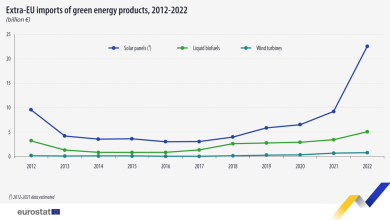Talking to Experts: Roxana Gureanu, Managing Director and CFO of HABAU Romania
When Finance Construction Meets Construction Financing
Nice meeting you, Roxana. Before starting our discussion, would you shortly introduce yourself to our readers?
Roxana Gureanu: I am a finance professional with almost 2 decades experience in leadership roles constructing sound corporate finance. Throughout the years I acted as an enabler of shareholders’ business interests, either by securing high end financing deals or by applying innovative financial solutions. The projects that I have financially supervised during this period together with my teams exceeded 1.5bn euros combined. I solve business bottlenecks and broker smart business solutions. I work with my fellow board members to identify business’ pain points and successfully navigate through them by applying the right solutions. My entire career is defined by “getting the things done”, even if this mean continuously learning new approaches and moving back and forth between finance and operational/project management. Not at last, I believe that happiness comes from liking what you do day by day. This is why I was never afraid to expand my interests outside the finance profession. Looking back in time, being a fashion entrepreneur, casino financial adviser, IT start-up investor and aspiring-to-be sailor helped me become the person that I am today.
What can you tell us about your role at HABAU?
Roxana Gureanu: As you might know, HABAU Romania is part of the HABAU GROUP family, an international full-service provider in the areas of building construction, civil engineering, precast construction, underground construction, pipeline construction, timber construction, steel, and steel plant construction. With an experience built to the highest standards for over 100 years and employing 6,000 employees, HABAU GROUP is presently active in 20 countries. In Romania, HABAU is present since 2000 and presently is the undisputed leader in oil and gas infrastructure.
As CFO for HABAU Romania, I am in charge with elaborating its financial strategy as well as with monitoring and controlling HABAU’s financial performance both in Romania and in its active branches from Serbia, Bulgaria, and Republic of Moldova. One of my main responsibilities is developing and maintaining strong working relationships with banks for securing projects’ financing, including, but not limited to, cash and non-cash credit lines or special financing on factoring.
Moving towards the operational/project management side of my role, I am co-managing HABAU’s Romanian, Serbian, Bulgarian and Republic of Moldavia operations and their 420 employees. I am fortunate to have as a co-managing partner, a great and experienced colleague with an extensive and successful professional career, a person from whom I’m learning a lot and with whom I work for achieving company’s goals. As coordinator of HABAU’s Commercial Finance, Accounting, Reporting, HR, IT, Marketing, Procurement and Tendering departments I also assess new projects’ viability and manage the relations with high-end local/regional stakeholders.
I would like now to expand our conversation framework by moving to a subject that would probably impact us all, if not already. Present events force Europe reconsiders its energy dependence on Russia. The late sanctions on Russia taken by EU leaders not only would impact European citizens wellbeing, when considering utilities impact on their day-to-day life, but also European energy future and its infrastructure development. Would you like to share with us your take on that?
Roxana Gureanu: In 2021, the EU had 45% of its total gas imports coming from Russia. Russia’s invasion in Ukraine in February 2022 has massively disrupted Europe’s energy system and its supply chain. The increase in oil prices since the beginning of the war has led to higher costs in all major aspects of life. This heighted energy security concerns, bringing to the fore the EU’s over-dependence on Russian gas and oil. Moreover, Russia used its gas and oil exports to Europe both to support its ongoing war effort and as economic and political weapon against countries that expressed solidarity with Ukraine. 85% of Europeans agreed on Europe reducing its dependency on Russian gas and oil. This is why the European Commission has lately introduced REPowerEU Plan through which it acts for diversifying its energy supply sources and reducing its purchase of Russian gas by two-thirds before the end of the year. As such, on July 18, the European Commission signed a memorandum of understanding with Azerbaijan to double imports of Azeri natural gas by 2027.
Europe’s new shift in the supply approach requires, among others, working on new/alternative transportation routes, increasing cross countries bi-directional interconnectivity, and building gas storage facilities. The new approach is expected to reduce the present discomfort of limited resource availability and subsequent high prices, faced both by European citizens and European industry in general. However, in my view, this winter people will still have to struggle, also because of old own consumption habits before returning to a better situation next year. In parallel, players in the energy infrastructure sector have to continue to support European plans by working on finalizing all the projects deemed relevant by the new strategy.
Speaking about how players from energy infrastructure sector have to support Europe’s new energy priorities, is it anything you can share regarding on if/how HABAU does that?
Roxana Gureanu: Thank you for raising this subject. Indeed, HABAU Romania has an extensive track of successfully closed projects that contribute to the diversification of natural gas supply sources of European countries. For example, HABAU Romania has been involved in the Development project of the National Natural Gas Transmission System on the Bulgaria-Romania-Hungary-Austria corridor (BRUA). We lead two of project’s segments, working in partnership with the most important construction companies in this line of business from Romania. These 2 segments amount for almost 300km of gas pipeline from this corridor. By building this pipeline, HABAU has contributed to the connection of central and eastern Europe’s energy markets to the natural gas reserves existing in the Caspian region. Only if we consider Bulgaria and Hungary, we are talking about 2.25 billion m3/year volume of natural gas coming only from this new source.
We have also successfully finished the construction of Jupa compression station, a technological installation interconnected to several gas pipelines on the same route, whose purpose is to compress the gas in the main pipes to which it is connected, in order to compensate for the pressure losses that are inherent in the natural gas transport process. An important aspect of this station is that it is bidirectional; it can compress gas from both directions: from Romania to Hungary and from Hungary to Romania as well.
Also, HABAU Romania with the help of HABAU GROUP has recently signed a contract for a new major project in the Balkan region, particularly the construction of the gas interconnector between Serbia and Bulgaria. The new interconnector is an important milestone on the roadmap that Serbia has to take in order to diversify its gas-supply options and reduce its reliance on Russian imports. Serbia plans do not limit only to the interconnector that HABAU will have to build for it; the country is looking as well at other potential inbound gas connections with regional neighbours such as Macedonia, Croatia, and Romania. HABAU Romania, as the leader of the association responsible for the implementation of the project on the Serbian territory will bring all its expertise acquired in its already successfully closed projects in order to support Serbian officials’ aim for the interconnector to start carrying gas by September 2023.
The new sanctions imposed to Russia by EU have already a tangible impact on many companies’ supply chain. How do you see finance department’s role on protecting your company business when facing these new challenges?
Roxana Gureanu: Ukraine and Russia are main producers of raw materials for the oil and gas industry, like steel and many others. Both, developments in Ukraine’s war theatre and disturbances in the global market due to sanctions imposed to Russia had a major impact in our industry by introducing delays in the supply chain. Delays in the delivery of production materials have had a cascading effect on prolongation of supply of finished good materials such pipes. When faced with this kind of business bottleneck, HABAU Romania looked for acquiring its projects needed finished materials from countries outside Europe, like China and Korea.
However, as the company didn’t have any historical track record of collaboration with these suppliers, it was also finance department’s role to secure solid commercial deals by assessing contract’s clauses, deadlines, and deliverables so to protect projects’ financial soundness. As some projects that were already in execution were projects funded via the European Union, thus limiting HABAU in finding possible suppliers outside Europe, the finance department was also involved in renegotiating with our partners terms and conditions in existing contracts in order to keep the works going and meet the required deadlines.
Can you please expand on finance department role in a construction company such HABAU?
Roxana Gureanu: Currently we have approximately EUR 130 million in recently signed contracts and ongoing projects. In order to support HABAU Romania carrying out existing and future projects, the finance department has to play a double role. On one hand, it has to act as an ‘Assistant Project Manager’ securing that all projects’ stages are financed and that moving from one project stage to another is made smoothly. For example, at one point, the finance department had to prepare all the financial structure behind the hiring of 90 non-EU (Ukraine and Vietnam) workers as HABAU needed to cope with the volume of contracted work. In another example, if we take the late regional project acquired by HABAU in Serbia, the finance department was involved in establishing strong working relationships with Serbian banks and government officials from Serbian Ministry of Finance.
On the other hand, finance department has also to act like a ‘Supervisor’ for company’s projects’ financial soundness. All projects have to be benchmarked against initial business assumptions, legal framework and company’s core values of accountability and business ethics. Usually, in doing so, finance department has used monthly reporting models that were offering relevant business snapshots for taking best ‘reality-checked’ decisions needed for making business as efficient and risk aversive as possible. However, with the pandemic and late war, this kind of backward-looking model is not enough. Not only that we were forced to consider moving from monthly reports to weekly reports, but also from backward-looking to forward-looking. The biggest challenges every CFO is facing right now is forecasting the future almost in real time and as close to the dime as possible. The old growth-rate-based forecasting showed its limitations in the pandemic. New realities changed the rules, so business models have to change themselves as well. What happened last year, in fact, even what happened over the last few months becomes almost irrelevant as realities brutally change. If late war taught us anything is that things are changing so quickly around us that management teams are forced to take big decisions almost in an instant. The frequency of business reporting has become a lot higher and the dependency on modelling to make really big decisions has also increased.
Have you thought how to respond to the challenges brought by these rapidly changing realities? Can you share with our readers some of the late initiatives that HABAU Romania took in which finance department has a leading role?
Roxana Gureanu: In fact, we have prepared an answer for these fast-changing realities, and I am happy that finance department is on the driver seat. HABAU Romania has just adopted the RISE with SAP package, becoming SAP’s first such client in Central and East Europe.
This decision will allow us to benefit from an integrated and robust IT system, which will increase our process efficiency, reporting capacity and ensure legal compliance. Our company will benefit from better project and contract management capabilities, having a consolidated and viable source for obtaining the information we need. Transactions can be made faster and more accurately, all stages of implementing a contract can be easily managed, including contractual changes, without affecting customer satisfaction.
The company will also have enhanced reporting, planning, and forecasting capabilities, as well as a clearer picture of employee work, through visibility into workload, productivity, and efficiency. This will also optimize our supply chain, from procurement to service delivery, which translates into even better customer service. HABAU Romania’s management team will enjoy a high degree of trust in contract management and service delivery, thanks to late accurate reporting, detailed and timely analysis, as well as improved overall information exchange.
It worth mentioning, that the success in being first in the region to adopt such a platform would have not been possible without the ongoing support from HABAU Group’s board, the one that offers us the necessary level of trust and belief to move things forward, becoming more efficient in building up a stable and promising future for our business.
The time of our interview is almost finished. In the end, is it anything else you would want to tell us about you? Maybe a favourite quote?
Roxana Gureanu: First, let me thank you once again for the opportunity of talking to Energy Industry Review’s readers. If allowed, I will give at the end a quote that I like a lot. It is a quote from Drew Dudley, whose speech about ‘Everyday Leadership’ can be found on Ted Talk’s platform. It goes like this: “I’ve come to realize that we have made leadership into something bigger than us; something beyond us. We’ve made it about changing the world… As long as we make leadership something bigger than us, as long as we keep leadership beyond us and make it about changing the world, we give ourselves an excuse not to expect it every day, from ourselves and from each other.
We need to redefine leadership… Because we’ve made leadership about changing the world, and there is no world. There are only six billion understandings of it… And if you change one person’s understanding of it, understanding of what they’re capable of, understanding of how much people care about them, understanding of how powerful an agent for change they can be in this world, you’ve changed the whole thing.”
I dedicate this quote to my team, the wonderful people with whom I work every day, side by side, the ones that turn ideas into actions, kindness, and support into a wonderful sense of belonging, the everyday leaders that change the world by keep helping me, for one, to discover better versions of myself.







